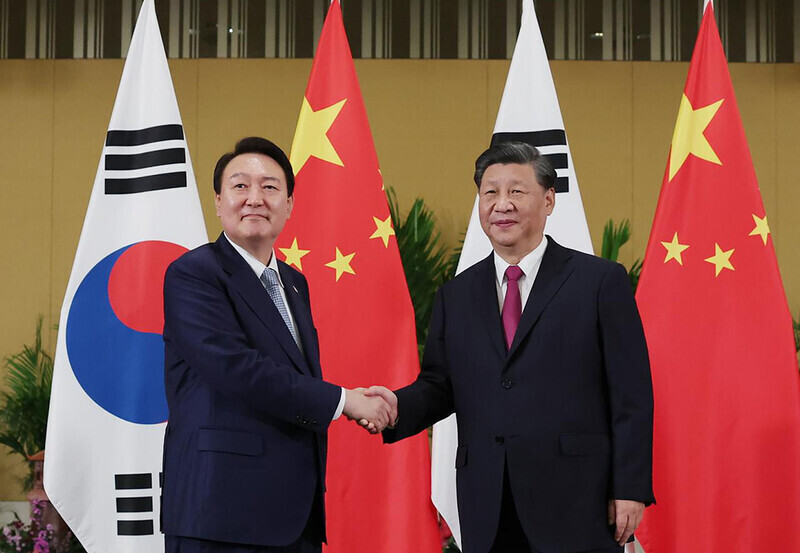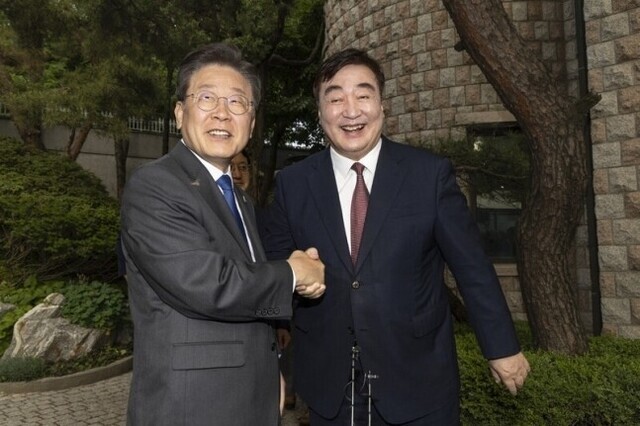hankyoreh
Links to other country sites 다른 나라 사이트 링크
Antagonism grows between S. Korea, China as both ramp up rhetoric on envoy’s remarks

Tensions between South Korea and China are escalating after China publicly criticized South Korean President Yoon Suk-yeol’s administration for US-leaning foreign policies. With the two governments trading blows, the confrontation only seems to be getting worse.
The presidential office on Monday sharply criticized China’s ambassador to South Korea, Xing Haiming, saying, “If the role of bridging is not carried out in an appropriate manner, it may harm the national interests of both the home country and host country.”
A key presidential official stated that “the role of an ambassador is to serve as a bridge between the home country and the host country,” in response to a question about Xing at a briefing held at the presidential office in Yongsan, Seoul.
“The Ministry of Foreign Affairs has fully conveyed our position [to China], and the Korean Embassy in China has also issued a position, so the presidential office has nothing more to add.”
The official followed up that statement by saying, “However, Article 41 of the Vienna Convention requires diplomats to respect the laws and regulations of the receiving state. The same article states that diplomats are obligated not to interfere in the internal affairs of that state.” In essence, the official is alleging that Xing violated the convention.
Earlier, Xing had criticized Yoon’s administration’s one-sided foreign policy toward the US in a meeting with Lee Jae-myung of the Democratic Party of Korea on June 8, saying that those “betting that the US would be victorious over China” would “certainly come to regret that.”
The ruling People Power Party (PPP) also criticized Xing’s remarks as an “intervention in internal affairs.”
“If China intervenes in our internal affairs much like a rude neighbor or undermines our national esteem, we will insist, as the ruling party, that the government should take necessary measures as a sovereign nation,” said Yoon Jae-ok, floor leader of the PPP. The floor leader added that the party “strongly calls for a sincere apology” from Xing and the Chinese government.
Kweon Seong-dong, a PPP lawmaker, called for restrictions on the voting rights of the 100,000 or so Chinese nationals residing long-term in South Korea in local elections, saying, “We must show a hard-line stance against meddling in internal affairs.”

However, the administration has distanced itself from the idea of designating Xing as a persona non grata.
“Nothing has been decided yet,” a senior presidential office official said in response to a question about calls for such a designation from the ruling party camp.
Prime Minister Han Duck-soo also did not directly respond to the PPP’s Kim Seok-ki’s argument that Xing should be designated persona non grata and expelled during a parliamentary questioning session later in the day, only saying, “I think the Chinese ambassador’s behavior was very inappropriate.”
Foreign Minister Park Jin also responded to another lawmaker from the PPP, Kim Sang-hoon, who was arguing for the designation of Xing, saying only that he had “clearly warned” the ambassador that “any consequences would be borne by Ambassador Xing himself..”
China’s Ministry of Foreign Affairs pushed back hard against the allegations, claiming that Xing is “working to advance China-ROK relations.”
Foreign Ministry spokesperson Wang Wenbin stated in a regular briefing that “it is part of Ambassador Xing Haiming’s job to engage extensively with people from various walks of life in the ROK with an aim of increasing understanding, promoting cooperation and advancing China-ROK relations.”
On Friday, after South Korea’s Foreign Ministry summoned Ambassador Xing to sternly warn him and express regret, China’s Foreign Ministry also “summoned” South Korea’s ambassador to China, Chung Jae-ho. This is the second such confrontation between South Korean and Chinese diplomatic officials under the Yoon administration, following an April interview with Reuters in which Yoon raised the Taiwan issue.
By Kim Mi-na, staff reporter; Choi Hyun-june, Beijing correspondent
Please direct questions or comments to [english@hani.co.kr]

Editorial・opinion
![[Column] Tariffs on China: Trump was dumb, Biden dumber [Column] Tariffs on China: Trump was dumb, Biden dumber](https://flexible.img.hani.co.kr/flexible/normal/500/300/imgdb/original/2024/0520/191716191153918.jpg) [Column] Tariffs on China: Trump was dumb, Biden dumber
[Column] Tariffs on China: Trump was dumb, Biden dumber![[Column] What if Seoul took reunification by force off the table? [Column] What if Seoul took reunification by force off the table?](https://flexible.img.hani.co.kr/flexible/normal/500/300/imgdb/original/2024/0520/3017161928630494.jpg) [Column] What if Seoul took reunification by force off the table?
[Column] What if Seoul took reunification by force off the table?- [Editorial] Intensifying US-China rivalry means Seoul must address uncertainty with Beijing sooner than later
- [Column] When ‘fairness’ means hate and violence
- [Editorial] Yoon must stop abusing authority to shield himself from investigation
- [Column] US troop withdrawal from Korea could be the Acheson Line all over
- [Column] How to win back readers who’ve turned to YouTube for news
- [Column] Welcome to the president’s pity party
- [Editorial] Korea must respond firmly to Japan’s attempt to usurp Line
- [Editorial] Transfers of prosecutors investigating Korea’s first lady send chilling message
Most viewed articles
- 1Xi, Putin ‘oppose acts of military intimidation’ against N. Korea by US in joint statement
- 2Kim Jong-un wanted to meet with residents of shelled Yeonpyeong Island in South, Moon recalls in mem
- 3Berlin mayor hints at tearing down ‘comfort women’ memorial in city
- 4[Column] What if Seoul took reunification by force off the table?
- 5To weigh costs and benefits, Korea must stop treating US troop presence as a sacred cow
- 6For new generation of Chinese artists, discontent is disobedience
- 7[Column] Tariffs on China: Trump was dumb, Biden dumber
- 8China, Russia put foot down on US moves in Asia, ratchet up solidarity with N. Korea
- 9Putin’s trip to China comes amid 63% increase in bilateral trade under US-led sanctions
- 10[Exclusive] Unearthed memo suggests Gwangju Uprising missing may have been cremated